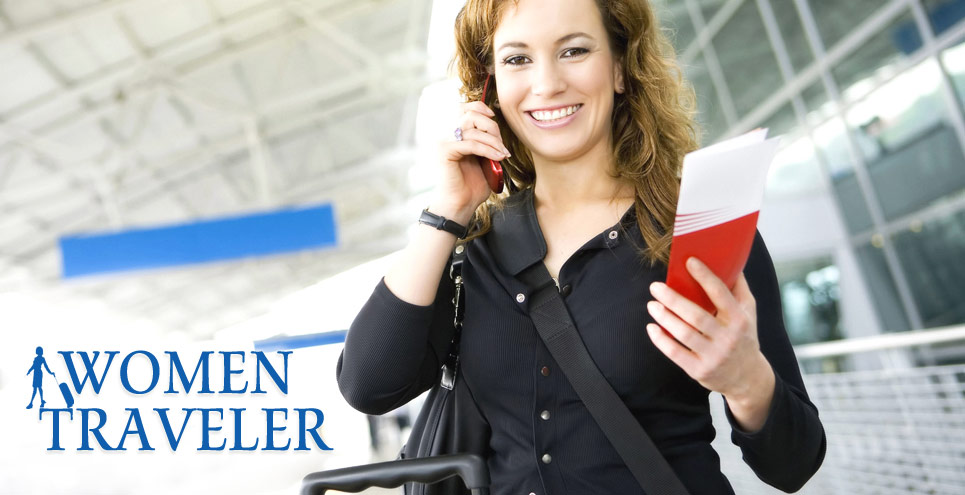Women Traveler

Women travel for countless reasons, whether to discover new frontiers, pursue
business opportunities, or simply to rest and relax - not unlike men. But when
it comes to health and security, and how travelers are affected by the religious
and cultural beliefs of the foreign countries they visit, there's a huge
difference between women and men. The truth is that women face greater
obstacles, especially when travelling alone. With careful planning, common
sense, and respect for religious and societal differences, you can minimize your
risks and maximize your chances of having a safe and successful trip.
Why Women Traveler?
The more you know about where you're going, the safer and happier your
travels will be. Before you leave, be sure to complete a risk assessment of any
country you're thinking of visiting. It will help you to choose a destination
where you'll feel safe and in your comfort zone. If you doubt you can put up
with the challenges and hazards of a particular country, strike it off your
list. Careful preparation is your key to safe and successful travel. By planning
ahead, you'll avoid hassles later. Always travel light, if possible, to protect
yourself against loss or theft of money and valuables. You'll be much less
vulnerable and more independent if you're not weighed down with a lot of
luggage. There's potential for sexual assault anywhere in the world. Taking
precautions is your best defence against becoming a victim.
Travelling solo has its benefits. You get to set your own pace, have more direct
contact with foreign cultures, and meet new friends more easily. But a lone
female traveler may also face unwanted attention or overwhelming obstacles in
some parts of the world. For example, in countries that employ a strict
interpretation of Sharia law, women may not be allowed to drive cars, travel
alone, or even go out in public without a male relative or a group of other
women. If you travel alone, you may want to choose countries with a more relaxed
attitude towards solo female travellers, where you'll face fewer challenges.
Otherwise, you may wish to team up with a travel companion - there's safety in
numbers.
Finding safe accommodations is one of a woman traveller's primary goals.
Travel on Net
Travel sites have been the largest contributors to online traffic in June
2012, according to comScore. In its monthly analysis of US web activity, the
digital measurement company found that ground and cruise travel sites ranked as
the top gaining category, growing by 9 percent to 14 million visitors since the
previous comparable month.
Amtrak.com took the leading spot in the category with 2.7 million visitors - an
increase of 7 percent. This was followed by bus and train company FirstGroup
which grew by 22 percent to 2 million visitors. Carnival Cruise Lines followed
with nearly 2 million visitors and a rise of 6 percent.
Hotel and Resort sites also scored among the top-gaining traffic categories in
June, growing 8 percent to more than 37 million visitors. Hilton Hotels came in
first place with 5.5 million visitors, while Marriott was second with 5.4
million visitors.
"June got off to a strong start with significant traffic gains seen at travel
and retail sites as Americans readied their free time for the long-awaited
summer months," noted Jeff Hackett, executive vice president of comScore, in a
press release.
As June's data is revealed, comScore has also expanded its display ad ecosystem
reporting. The move is aimed at providing "additional granularity" in the
classification of ad publishers, networks and other platforms that comprise the
sector, said the company.
With increased awareness, thorough preparation, and a measure of caution, you
can travel almost anywhere bravely and responsibly.
79 million people in the United States used the Internet when making travel
plans, according to the Travel Industry Association, based in Washington, D.C.
The "big three" of online travel planning-- Orbitz, which was launched in 2001
by a consortium of commercial airlines and later purchased by Cendant, Expedia
which was founded within Microsoft (nasdaq: in 1995; and Travelocity--are used
by 28% of North Americans who book leisure travel. They have been joined by a
number of other options; there are now more ways to plan and book your next
vacation or business trip online than ever before. And travelers are taking
advantage of all of them.
"Travelers are on the leading edge of technology adoption," says Henry
Harteveldt, a vice president at Forrester Research, a technology market-research
company in Cambridge, Mass. "They adopt trends before the mainstream, are better
educated and have more disposable income. They are picky people. Having control
over making travel arrangements is very important, and the Web plays well into
that."
According to Harteveldt, online leisure travel is the largest e-commerce
category, and in the U.S. it is projected to generate $74.4 million in sales in
2006, an increase of almost 17% over the $63.6 billion spent in 2005. By 2009,
Forrester Research predicts, online travel spending in the U.S. will rise to
$110.5 billion.
Overseas, online travel planning is picking up steam even faster than it is in
the U.S. Spending on online travel in the U.K. and Western Europe will rise
about 42% to €30.7 billion in 2006, or about $36.8 billion, Harteveldt says. By
the end of the decade that number will approach €50 billion, or about $60
billion.
- Top 10 Yoga Retreats For a Healthy Holiday
- Top 10 World's Best Luxury Boot Camps and Health Destinations
- Top 10 Rejuvenation Hotels and Resorts on this Planet
- Top 10 Holiday Family Wellness Resorts
- 20 Minute Workout on the Move
- 12 Hotel Fitness Centers with Killer Views
- Get Fit With These Original Fitness Features
- Best Spots to Scuba Dive
- The Best Hotels for Adrenaline Junkies
- Yoga asanas for motion sickness